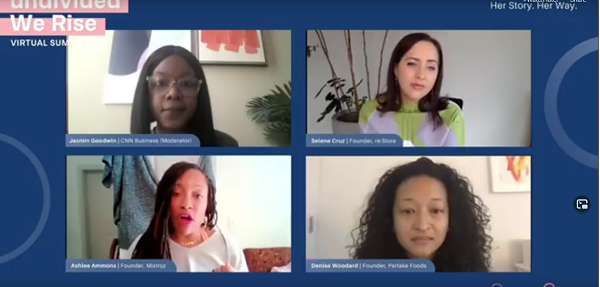Digitalundivided’s ProjectDiane Chronicles State of Black and Latinx Women Founders
In 2019, when digitalundivided, a nonprofit organization supporting black and Latinx women startup founders, established its headquarters in Newark, it was best known for ProjectDiane, its groundbreaking research program focusing on the state of funding for this important demographic group.
The organization, which was founded in 2012, also runs an incubator for startup founders. We covered its 2019 Newark Demo Day for its incubator program, BIG, in a two-part article here and here.
ProjectDiane was named after Diane Nash, a civil rights leader. The first ProjectDiane report, in 2016, raised awareness of the unfair situation confronting Black and Latinx women. “ProjectDiane 2016 wildly exceeded expectations by initiating an industry-wide call to action that resulted in an increase of over 500 percent in the number of Black women-led businesses,” the organization noted in the foreword. The report was updated in 2018, and again in 2020.
Much of the research presented in the digitalundivided reports came from surveys of Black and Latinx women founders. There are now 650 of them in the ProjectDiane database. That’s more than double the number that were in the database in 2018.
The bottom line of the 2020 report? Some progress has been made in the state of entrepreneurship for females of color, but there is still much more to do.
For example, while the 2020 report shows progress in the amount of money women of color received through angel and VC fundraising, the situation is still grim. While the total funds raised by Black and Latinx women founders are now up to $3.1 billion, Black and Latinx women have received just 0.64 percent of all VC investment since 2018.
Another example: Black and Latinx women founders have collected $479,000 in seed funding, compared with the seed median of $2.5 million for all startups. For Black and Latinx women founders who have raised less than $1 million, the median seed totals are $125,000 for Black women founders and $200,000 for Latinx founders.
There were some positive indicators brought to light by the research. For example, the number of Black and Latinx women who have raised at least $1 million in funding is now 183, while the 2018 list had only 79 women who had reached that goal.
In the background section of the 2020 report, the digitalundivided team notes that “engagement and interest in entrepreneurship, tech startups, and the representation of women and people of color as founders has increased drastically. There is also greater social awareness of the barriers facing Black and Latinx women entrepreneurs, who represent the fastest-growing groups of entrepreneurs in the United States.”
When the organization examined its own database, it found that 73 percent of the companies in the 2018 database were still active in 2020. The failure rate for the companies in the 2018 database was 27 percent lower than the 40 percent average two-year failure rate for startups founded at that time.
According to the report, the majority of startups represented in the 2020 database were founded in California, New York or Georgia. The research included input from women in 36 states and the District of Columbia, but 28 percent of those responding were in California and 21 percent in New York.
“Georgia is the home to an increasingly significant share of startups among Black women founders,” the report stated. The Atlanta metro area “has exploded as a hub for Black entrepreneurship” during the last few years, it continued.
The participating founders were very well educated, according to the report, which noted that “90 percent of ProjectDiane founders have a Bachelor’s degree, and 50 percent have a Master’s degree or PhD. The most-attended school overall among Black & Latinx women founders (undergraduate and graduate combined) is Stanford University, one of the top 5 schools for VC-backed entrepreneurs. … At the undergraduate level, Howard University produced more Black women founders than any other school. The top producers of Latinx women founders are Stanford, University of California-Los Angeles, New York University, Columbia University, and MIT.”
While most of the startups represented were tech or tech enabled, the research showed that 70 percent of the founders did not have a STEM degree at the undergraduate or graduate level, suggesting that Black and Latinx women founders have found their way to entrepreneurship through a variety of educational and career pathways.
The organization offered some ideas as to how people can help Black and Latinx female founders:
- If you are an influential connector and networker, tap into your resource-rich networks and extend an opportunity to make introductions.
- If you are a community leader, spread the word about the stats in this report to the community.
- Write a check. Look beyond race and gender, and see founders for their innovations first. “The entrepreneurial journey is often compared to building a plane while flying it. Black and Latinx women founders are not only expected to build the plane; but they are also expected to create the materials from dust. Rethink your perception of what a unicorn CEO should look like.”
- Create more pipelines. As the 2020 report says, “The next generation of founders and CEOs will not be cultivated within the same circles of privilege as [in years] past. It falls on us to create more pathways of success for women of color into innovation and entrepreneurship. … Fund an accelerator or an incubator. Invest in education, mentorship, and training. Interview and hire diverse candidates. Promote them, because they’re working twice as hard. Write policy that supports their endeavors.”




